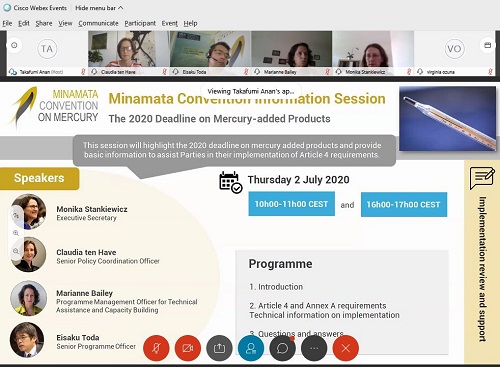
On 2 July, the Secretariat convened information sessions to highlight the 2020 deadline for mercury-added products under the Minamata Convention, and provide essential information to assist Parties in their implementation of Article 4 in this regard.
To cover all time zones, the first session was held at 10:00 Geneva time, and the second at 16:00 Geneva time. With nearly 100 participants in the morning session and 87 in the afternoon, these information sessions covered the Convention's provisions to reduce mercury in products and manufacturing processes as formulated in Article 4 and Annex A. The Secretariat also introduced the provisions of Article 6 on exemptions available to a Party upon request. Furthermore, the Secretariat shared the information received so far on these provisions, and from Parties and others on progress made towards meeting the deadline. The presentations were followed by a Q&A session.
In the introduction, the Executive Secretary of the Minamata Convention, Monika Stankiewicz, emphasized that "in negotiating the Convention, countries took bold steps forward so that Parties would commit to reducing the amount of mercury available for use and in global circulation. One such bold step is to phase-out products that contain mercury".
Under Article 4, the Convention sets out to reduce mercury demand in products through a combination of measures which phase out mercury uses in many key products, phase down mercury use in dental amalgam, and discourage the manufacture of new products using mercury.
Annex A, Part 1 of the Convention, lists the mercury-added products for which, by 2020, the manufacture and import or export of the product shall not be allowed. These include specific batteries, switches and relays, fluorescent lamps, cosmetics, pesticides, thermometers, blood pressure cuffs, and other measuring devices where mercury is intentionally added.
Article 6 provides a mechanism for Parties to be granted more time to meet their obligations under Article 4. Mercury-added products accounted for about 25% of global mercury use in 2015, according to the UNEP report on Supply, Trade and Demand, and they create significant waste management challenges for countries.
More information: